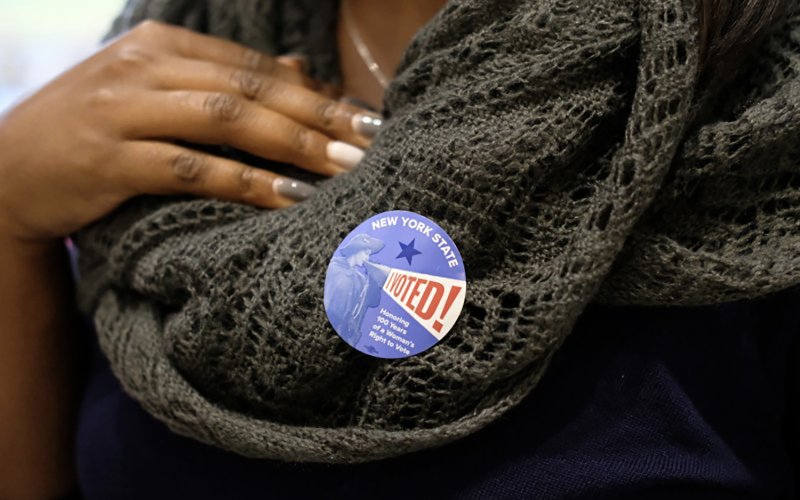As Midterms Near, Faculty, Students Weigh in on Issues

ALBANY, N.Y. (Nov. 1, 2022) — The 2022 midterm elections will be held on Nov. 8. A number of seats in the U.S. Senate are at stake, as well as governorships and all 435 seats in the U.S. House of Representatives.
Early voting in New York began on Oct. 29 and runs through Nov. 6, where voters will choose between Kathy Hochul and Lee Zeldin for governor and Charles Schumer and Joseph Pinion for the U.S. Senate in addition to numerous other races.
At UAlbany, viewing parties and panel discussions are scheduled, with topics such as the issues motivating voters and the key races to watch will take center stage. Students, faculty and staff also are participating in other ways, such as through contributed research, commentary and policy discussions on election-related issues.
Researchers at the Center for Technology in Government have been working with the New York State Board of Elections (NYSBOE), Albany Law School, International Data Corporation and the Rockefeller College of Public Affairs and Policy on U.S. voter registration practices. This summer, doctoral student Battulga Buyannemekh co-authored a case study with CTG Program Director Meghan Cook and NYSBOE Co-Executive Directors Kristen Zebrowski Stavisky and Todd Valentine on “Envisioning an Elections Future: Exploring the Technology, Policy, Management and Legal Environments in Voter Registration.” They presented their findings at the 2022 Election Science, Reform, and Administration Conference hosted by the University of North Carolina, Charlotte.

“The purpose of our study is to help continue to inform future investments in voter registration made by New York State and local elections agencies,” said Buyannemekh, who is working toward a PhD in Public Administration and Policy from Rockefeller College. “If we look at the issues of technology and voter registration through the lens of administration, e-government and e-democracy, we can see that investments in critical elections infrastructure are core to transforming government operations.”
In continuing the larger area of work that CTG UAlbany and Cook is carrying out with the NYSBOE on elections infrastructure, she has also co-authored an article in Social Education, published by the National Council of Social Studies. The article entitled, “How Do We Ensure that Elections are Free and Fair?: An Inquiry-BaseD Mini-Unit” was written in collaboration with Associate Professor of Educational Theory and Practice and CTG Faculty Fellow Brett Levy and Nora D. Schaffer, a recent UAlbany graduate who is now a high school history teacher in Brooklyn and a PhD student at Teachers College, Columbia University.
The article, driven by Levy, who is an expert in how educational programs support civic engagement among youth, focuses on how to teach secondary school students about election integrity.
“This article provides background information about our election system and a straightforward method for educators to help students understand how elections are managed, including the processes of registration, voting, tallying, and certification,” said Levy. “It also provides links to numerous reliable sources where students can explore details about each of these processes and about the real challenges faced by our election system, such as misinformation.”
“This article boils down in an easy-to-understand format the allegations against elections integrity and the bi-partisan processes and technology safeguards in place that prevent fraud,” said Cook, who is also adjunct professor of Public Administration and Policy at Rockefeller College.
On Levy’s monthly podcast, “Education for Sustainable Democracy,” this month’s episode features a recently recorded discussion with Thomas Connolly, NYSBOE Director of Operations, and Brendan Lovullo, NYSBOE Deputy Director of Operations and Cook. It offers an additional resource for teachers and students interested in learning about the safeguards surrounding the U.S. electoral process.
For students, faculty and staff interested in learning more about the 2022 midterms, the panel discussion and viewing night party are open for registration now:
Monday, Nov. 7, 12:30 p.m.: 2022 Midterms – The issues motivating voters and the races to watch
Part of the Rockefeller College 75th Anniversary Lunch & Learn Series, the event will be a virtual panel discussing the hot button issues and the key races to watch with the following panelists:
- Sally Friedman, associate professor, Department of Political Science
- Libby Post, adjunct professor, Department of Public Administration & Policy
- Michael Malbin, O'Leary Professor, Department of Political Science
Tuesday, Nov. 8, 7 p.m.: Election Night Viewing Party
Alumni, faculty, staff and students are invited to gather at Damien's Restaurant in the Campus Center to watch as the election results come in. There will be games, light food and drink, networking and watching as election results are reported from a variety of news sources. The event is co-sponsored by Pi Sigma Alpha, The National Honor Society.




